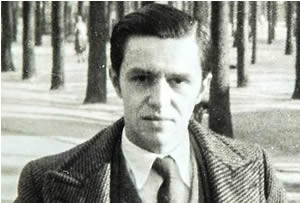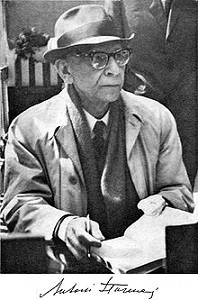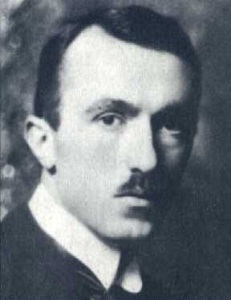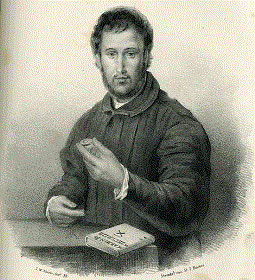De Franse schrijver en journalist Lucien Rebatet werd geboren op 15 november 1903 in Moras -en- Valloire, Drôme. Zie ook alle tags voor Lucien Rebatet op dit blog.
Uit: Les décombres
« Nous roulions en direction de Montlhéry. Quelques kilomètres après Versailles, un embouteillage inouï nous arrêta tout à coup. Nous n’étions plus en retraite, mais au milieu d’une débâcle sans précédent. Le flux des fuyards vomi de Paris par cinq ou six portes était venu se confondre inextricablement à ce carrefour. Tous les aspects de la plus infâme panique se révélaient dans ces voitures, remplies jusqu’à rompre les essieux des chargements les plus hétéroclites, femelles hurlantes aux tignasses jaunes échevelées se collant dans les trainées de fard fondu et de poussière, males en bras de chemises, en nage, exorbités, les nuques violettes, retombé en une heure à l’état de la brute néolithique, pucelles dépoitraillées à plein seins, belles-mères à demi-mortes d’épouvante et de fatigue, répandues parmi les chienchiens, les empilements de fourrures, d’édredons, de coffrets à bijoux, de cages à oiseaux, de boites de camemberts, de poupées-fétiches, exhibant comme des bêtes devant la foule leurs jambons écartés et le fond de leurs culottes. Des bicyclettes étaient fichées entre les garde-boues. Des enfants de douze ans étaient partis agrippés aux portières de petites neuf chevaux au fond desquelles s’emmêlaient dix paires de jambes et de bras. Certains avaient arrimé des lits-cages à leur malle-arrière. Des voitures de deux cent mille francs portaient sur leurs toits, enveloppés dans des draps sales, deux ou trois célèbres matelas de juin Quarante, disparaissaient sous des paquets d’on ne savait quoi ficelés dans des journaux et de vieilles serviettes éponges, pendant le long des garde-boues. Des ouvrières s’étaient mises en route à pied, nu-tête, en chaussons ou en talons Louis XV, poussant deux marmots devant elles dans une voiture de nourrice, un troisième pendu à leur jupes. Des cyclistes étaient parvenus jusque là on ne savait comment, traînant sur leurs vélos leurs échines la charge d’un chameau de caravane. Des gens avaient emportés un peignoir de bain, un aspirateur, un pot de géranium, des pincettes, un baromètre, un porte-parapluie, dans l’affolement d’un réveil de cauchemar, une empilade éperdue, le pillage forcené d’un logis par ses propres habitants. »

Lucien Rebatet (15 november 1903 – 24 augustus 1972)
In 1931
De Poolse dichter en schrijver Antoni Słonimski werd geboren op 15 november 1895 in Warschau. Zie ook alle tags voor Antoni Sionimski op dit blog en ook mijn blog van 15 november 2009 en ook mijn vier blogs van 15 november 2010.
Hamletism
Long did I look into the dark eyes of my brother,
Into eyes well-known, although the face was not,
As he spoke, as he cautiously weighed out each word
In Leningrad, on sombre Marat Street.
Michal, Aunt Fanny’s, Uncle Ludwik’s son,
Names which awake the wistful taste of childhood,
Sternly and gravely concludes the discussion.
And yet he’s my cousin. A very close relation.
Magnitogorsk and Urals. With us or against.
Stalin, the Party. Vast, incessant toil.
The Five-Year Plan. As children five years old
We used to exchange letters. Michal looks ill.
Light of young eyes, yet hair untimely grey.
Calm, but intent, faithful in what you do,
You serve and you want to serve your country well
And you say: ‘Good night, prince.’ – ‘Good night, Horatio.’
To the Germans
PROUDLY looking at the ruins of the conquered city,
Carrying a short, bloody sword, from an empty yard
A Roman barbarian entered the house of Archimedes
When the legion of Marcellus conquered Syracuse.
Half-naked, breathing heavily, in his dusty helmet,
He stopped, his nostrils drinking in new blood and crime.
‘Noli tangere circulos meos’
Said Archimedes gently, drawing in the sand.
On the circle, along the diameter and the inscribed triangle
The blood ran in a dark and living sign.
Archimedes, defend yourself against the mercenary!
Archimedes, who are murdered today!
Your blood sank into the sand, but your spirit lives.
Not true. The spirit dies as well. Where do traces remain?
In the marble of your house are adders’ nests.
The wind spins circles out of sand on ruined Hellas.
Vertaald door Peter Dale Scott en Czeslaw Milosz

Antoni Słonimski (15 november 1895 – 4 juli 1976)
De Amerikaanse schrijfster Elizabeth Arthur werd geboren op 15 november 1953 in New York. Zie ook alle tags voor Elizabeth Arthur op dit blog en ook mijn blog van 15 november 2009 en ook mijn vier blogs van 15 november 2010.
Uit: Till We Depart
“The young woman with bougainvillea red hair licked her silver encrusted finger, and giggled as she turned away from the passengers jostling each other beneath the DEPARTURES board.
She shrugged her shoulders, in a this-is-delicious-try-some way, towards the young man seated opposite her. He glanced up, and as he crossed his feet awkwardly, his yellow fluoro socks dazzled the underside of the table. His thin face blushed to match the woman’s hair – then he continued reading his book.
The young woman moved her chair around the table like a die being rolled to the next player. She inclined her head towards the tabletop’s decorative seaside scene. The young man lowered his book. He spluttered, trying to loosen a ragged piece of phlegm.
“Excuse me, but what do you want?”
The young woman looked up sideways into his mouth. She held a piece of cake icing delicately between her fingers.
“Try it,” she whispered, as the cacophony of ‘please make your way through security to gate lounge thirty six’, and the rattling of cups and saucers and early morning coughs boomed around the food court. “Don’t worry, it hasn’t got any evil marzipan on it. You don’t like marzipan either, do you?”
The young man tried to speak. His book slid off the table.
“Ssh,” the young woman said, and delicately pushed the thick, satiny, white confection into his mouth.
“A wedding cake,” she stated as she peeled foil and plastic wrapping away. “Imagine…one of those ten storey sky scraper cakes with a miniature bride and groom supervising the reception.”
“Um…I’m…”
The young woman’s fingers crept around the distant corner of the cake and retrieved two icing rosettes.
“One for you and one for me.”
The overpowering sweetness of the rosette tingled along the young man’s teeth as he bit into it. Its sugary petals melted over the roof of his mouth. He smiled. He pulled at his shirt collar.
“Have you been to a wedding…”
“Ssh,” the young woman said. “The cake is dark, rich and moist…” She broke off a piece and placed it in the centre of the table. She opened her mouth, rolled her tongue along her bottom lip and leaned towards him.”

Elizabeth Arthur (New York, 15 november 1953)
De Italiaanse schrijver Carlo Emilio Gadda werd geboren op 15 november 1893 in Milaan. Zie ook alle tags voor Carlo Emilio Gadda op dit blog en ook mijn blog van 15 november 2009 en ook mijn vier blogs van 15 november 2010.
Uit: That Awful Mess on the via Merulana (Vertaald door William Weaver)
“The tight garters, curled slightly at the edges, with a clear, lettuce-like curl: the elastic of lilac silk, in that hue that seemed in itself to give off a perfume, to signify at the same time the frail gentleness both of the woman and of her station, the spent elegance of her clothing, of her gestures, the secret manner of her submission, transmuted now into the immobility of an object, or as if of a disfigured dummy. Taut, the stockings, in a blond elegance like a new skin, given to her (above the created warmth) by the fable of our years, the blasphemy of the knitting machines: the stockings sheathed the shape of the legs with their light veil, modeling of the marvelous knees: those legs slightly spread, as if in horrible invitation. Oh! the eyes! where, at whom were they looking? The face! . . . Oh, it was scratched, poor object! Under one eye, on the nose! Oh that face! How weary it was, weary, poor Liliana, that head in the cloud of hair that enfolded it, those strands performing a final work of mercy. Sharpened in its pallor, the face: worn, emaciated by the atrocious suction of Death.
A deep, a terrible red cut opened her throat, fiercely. It had taken half the neck, from the front toward the right, that is, toward her left, the right for those who were looking down: jagged at its two edges, as if by a series of blows, of the blade or point: a horror! You couldn’t stand to look at it. From it hung red strands, like thongs, from the black foam of the blood, almost clotted already; a mess! with some little bubbles still in the midst. Curious forms, to the policemen: they seemed holes, to the novice, like red-colored little maccheroni, or pink. “The trachea,” murmured Ingravallo, bending down, “the carotid, the jugular! . . . God!”

Carlo Emilio Gadda (15 november 1893 – 21 mei 1973)
In 1921
De Nederlandse humanistische dichter Janus Secundus (eigenlijk Jan Everaerts) werd geboren in werd geboren in Den Haag op 15 november 1511. Zie ook alle tags voor Janus Secundus op dit blog en ook mijn blog van 15 november 2009 en ook mijn vier blogs van 15 november 2010.
De vierde kus
Zij geeft nektar, Neaera, ’t zijn geen kussen,
zij geeft dauw van haar ziel bedwelmend geurig,
zij geeft nardus en thijm, kaneel of honing,
zóals bijen die peuren, op Hymettus
of in rozenpriëlen in Athene
her en der, om in maagdelijke was te
bergen binnen een korf van tenen vlechtwerk,
Als mij daarvan nog meer te beurt zou vallen,
zou ik daardoor meteen onsterflijk worden
en ik zou van het godenmaal genieten,
Maar voorzichtig voorzichtig met die gaven,
of word liever godin, Neaera, met mij.
Zonder jou wil ik niet met goden eten,
ook als Jupiter werd verjaagd niet en ik
heersen zou in het rose rijk der goden.

Janus Secundus (15 november 1511 – 1536)
